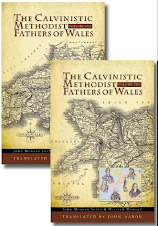The Encyclopedia Britannica of 1911 spoke of John Elias in these terms:
JOHN ELIAS (1774-1841), Welsh Nonconformist preacher and reformer, was born on the 2nd of May 1774, in the parish of Abererch, Carnarvonshire. In his youth he came under the influence of the Calvinistic Methodist revival and became a preacher at 19.
In 1799 he married and settled at Llanfechell, Anglesey, giving up his trade as a weaver to become a small shopkeeper. His fame as a preacher increased, and under the direction of Thomas Charles of Bala he established numerous Sunday schools, and gave and secured considerable Welsh support to the founding of the London Missionary Society, the British and Foreign Bible Society and the Religious Tract Society.
On Charles's death in 1814 he became the recognised leader of the Calvinistic Methodist Church, and the story of his life is simply a record of marvellously successful preaching tours.
He died on the 8th of June 1841; ten thousand people attended his funeral.
His eloquence was so remarkable that he was known as "the Welsh Demosthenes". His strength lay in his intense conviction of an intimate connection between sin and punishment and in his power of dramatic presentation. As an ecclesiastic he was not so successful; he helped to compile his church's Confession of Faith in 1823, and laid great stress on a clause which limited the scope of the atonement to the elect. He was a stout Tory in politics and had many friends among the Anglican clergy; he opposed the movement forRoman Catholic emancipation. Several of his sermons were published in Welsh.
His eloquence was so remarkable that he was known as "the Welsh Demosthenes". His strength lay in his intense conviction of an intimate connection between sin and punishment and in his power of dramatic presentation. As an ecclesiastic he was not so successful; he helped to compile his church's Confession of Faith in 1823, and laid great stress on a clause which limited the scope of the atonement to the elect. He was a stout Tory in politics and had many friends among the Anglican clergy; he opposed the movement forRoman Catholic emancipation. Several of his sermons were published in Welsh.






No comments:
Post a Comment